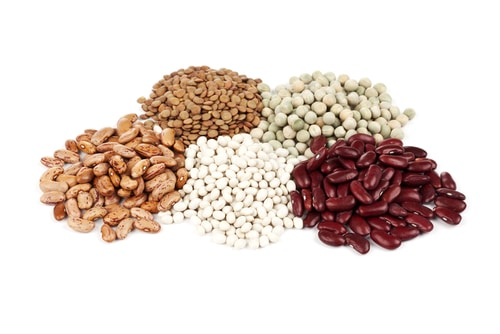
Plant-Based Protein versus Animal-Based Protein
Animal sources of protein like meat and dairy contain all of the essential amino acids your body needs to build functional proteins and lean body mass. Essential amino acids are ones your body can’t make and must come from dietary sources. If you’re deficient in some of these essential amino acids, it can impact your health by weakening your immunity against disease and even affect your fertility. You need to the full range of essential amino acids every day from dietary sources since your body can’t store them. That’s why it’s important to eat a variety of plant-based sources of protein since many plants are deficient in some of these essential amino acids. By varying the types of plant foods you eat, you can get all of the essential amino acids you need for good health.
Protein Content of Vegetables – Legumes Top the List
Legumes, like beans and lentils, are classified as a vegetable by many sources, and they top the list of protein-rich veggies. Soybeans are one of the best sources of plant-based protein with almost 35 grams of muscle-building protein per serving. Lentils are another good protein source at 9 grams per serving. Most other beans have between 6 and 8 grams of protein per half-cup serving. Beans and lentils are all deficient in one or more essential amino acids, with the exception of soybeans, but combining them with whole grains supplies the essential amino acids that are missing. That’s why beans and brown rice is a popular meal for vegetarians.
Green Veggies That Are Good Protein Sources
Some of the same vegetables that supply your body with vitamins, minerals, fiber, and antioxidants also have moderate amounts of protein. Your best bet is peas with almost 6 grams of protein per serving, but spinach, asparagus, cauliflower, broccoli, and Brussels sprouts are other good options with around 3 grams of protein per serving. They have other benefits as well. Brussels sprouts, cauliflower, and broccoli are members of the cruciferous family of vegetables, a group of vegetables known for their natural cancer-fighting chemicals. Asparagus is a good source of powerful anti-inflammatory compounds called glutathiones, while spinach is packed with carotenoids that are important for healthy vision. You won’t get those benefits when you eat a piece of meat.
One problem with trying to get most of your protein from plant sources is the fact that the best plant-based protein sources like soybeans, beans, and lentils contain phytic acid that can block the absorption of minerals like calcium, magnesium, zinc, and iron. Vegetarians who eat large amounts of these foods are at greater risk for mineral deficiencies. Protein from some plant sources is also not digested and absorbed as easily as animal-based sources of protein. This means you’ll usually have to eat more vegetable protein to meet your protein needs.
The Bottom Line?
Some vegetables, especially beans and lentils, are a decent source of protein, but they lack sufficient levels of some essential amino acids and aren’t as easily digested and absorbed as animal protein. You can overcome this by eating vegetables with whole grain foods and by eating a diversity of plant-based protein sources. It’s possible to meet your protein needs without eating meat and dairy, but it takes planning.
References:
J Exp Med. 1973 January 1; 137(1): 1–9.
J. Nutr. September 1, 2003 vol. 133 no. 9.
Related Articles By Cathe:
Is Animal Protein More Effective Than Plant Protein for Building Muscle?
Is Your Protein Powder More Contaminated Than You Think?
What’s the Best Type of Protein for Boosting Muscle Protein Synthesis?
How Much Protein Do You Really Need in Your Diet?
2 Factors That Determine the Quality of a Protein
New Study Suggests More Protein is Better for Building Muscle

